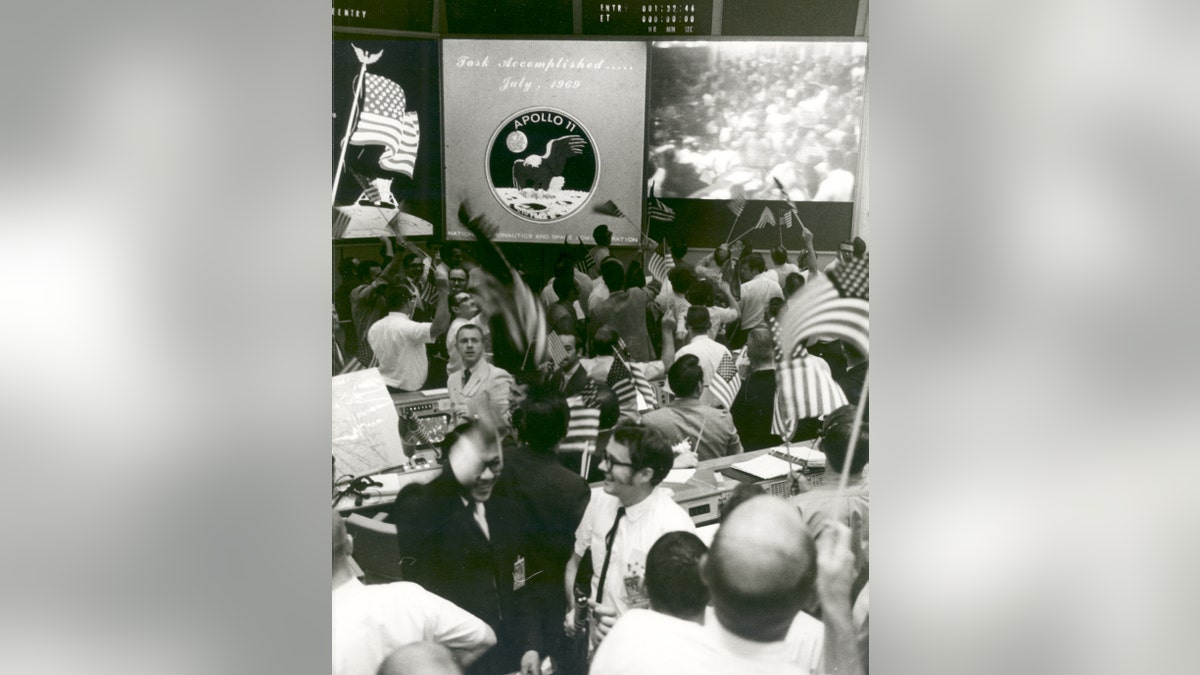Remembering the historic Apollo 11 launch on its 50th anniversary
Apollo 11 was the first spaceflight to land humans on the moon.
Out in the middle of the Pacific Ocean, descending from the sky, were three orange parachutes carrying a burned-up space capsule, three Americans and the bookend to the most momentous event in human history.
Minutes later, Apollo 11 splashed down in the water, fulfilling the goal of a nation: perform a manned lunar landing and return.
The day was July 24, 1969, 50 years ago today. Inside the Apollo 11 capsule were the first two men to ever set foot on the moon, Neil Armstrong and Buzz Aldrin. Also with them was Michael Collins, the astronaut who piloted the command module and orbited the moon for 21 hours and 36 minutes while Armstrong and Aldrin were leaving lunar footprints. All three were alive and healthy, returning to Earth after being off in space for nine days.
But the story wasn’t over yet. The astronauts had to be rescued from the ocean.
That’s where the USS Hornet comes in. The aircraft carrier had left California on a mission they just learned about: recover Apollo 11.
REMEMBERING AMERICA'S HISTORIC MISSION TO THE MOON
That meant removing the men from the capsule, getting them in a small boat, hoisting them up to a helicopter and bringing them aboard the Hornet, where President Nixon and numerous other dignitaries were proudly waiting.
“We were just very, very focused,” said Rolf Sabye, who served on the Hornet in the navigation department as a quartermaster second class petty officer.

Rolf Sabye served on the Hornet in the navigation department as a quartermaster second class petty officer. (Courtesy of Rolf Sabye)
“Well, we had worked hard for several weeks after leaving Hawaii. We had 16 training exercises where our main job on the ship was to pull up next to the capsule and recover the capsule after the astronauts had been recovered by the helicopter,” he recalled.
"It was a pretty important event. But then, we realized that people around the world were watching it,” Saybe said. "I always felt being on the bridge was really close to the heartbeat of the ship. It was pretty special. I'm pretty proud of having been part of it.”
Tim Wilson said he felt the same.
He, too, was on board the USS Hornet as a lieutenant and public affairs officer.
“This was a really big deal and, after coming back from Vietnam, it was almost like getting an extra-rich dessert or something like that,” Wilson remembered. “We were getting to do something really, really neat.”
Being that it was 1969 and the sailors had been living on their ship, in the middle of a war, Wilson recalled the ship’s crew kind of being in the dark about the whole thing.

Tim Wilson was on board the USS Hornet as a lieutenant and public affairs officer. “This was a really big deal and, after coming back from Vietnam, it was almost like getting an extra-rich dessert or something like that,” Wilson said. (Courtesy of Tim Wilson )
"We didn't really know what was going on,” he said. "We didn't have a sense of what sort of emotions were going on at the mainland or with our families or things like that because we did not have access to any television feeds or anything in terms of the launch of Apollo 11 or the trip to the moon or the walking on the moon."
And 50 years later, Wilson still feels just as proud as he did back then.
CLICK HERE TO GET THE FOX NEWS APP
“I think everybody just feels very, very attached to what we did here and our place in history,” he said. “[We’re] very lucky to have been a part of it.”
Saybe said the Hornet’s crew all performed professionally and patriotically.

Flight controllers at Mission Control applaud the splashdown and success of the Apollo 11 lunar mission on July 24, 1969. (NASA)
"It was only on the day of splashdown, really, when all these dignitaries appeared on board, President Nixon, and everybody else that we knew,” he said, remembering feeling a little awestruck.
"Wow. This is the real thing here, today's the day and this is really cool. I did not sense any anxiety whatsoever from the people that I was involved in here. I'd say (there is) a tremendous amount of pride in that. In terms of the United States and in terms of our role in this thing.”
The three astronauts they rescued from the Pacific went on to become world famous and instant national heroes – all with a little help from the crew of the USS Hornet.









































